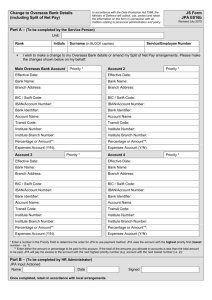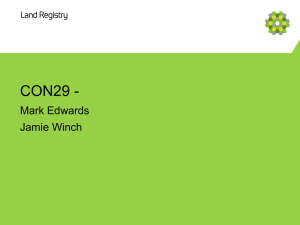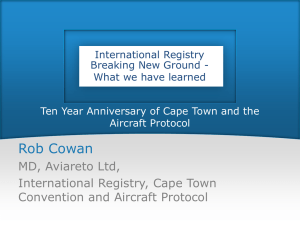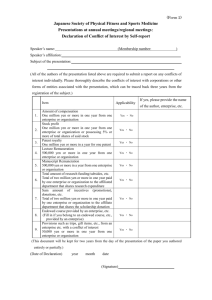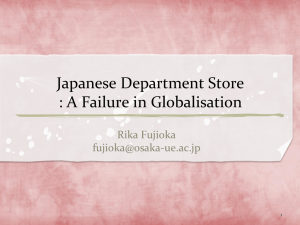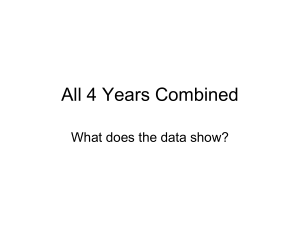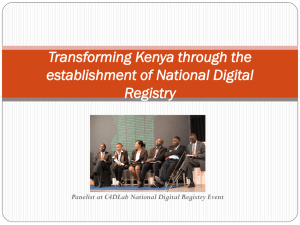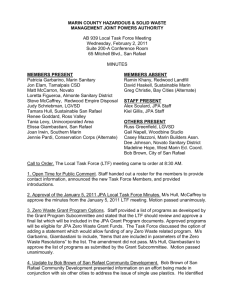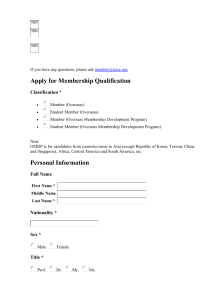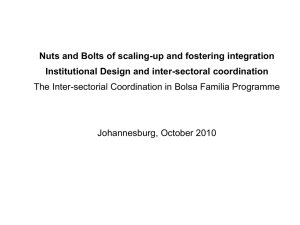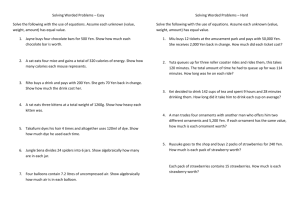資料2(PPV) - 日本難病・疾病団体協議会
advertisement
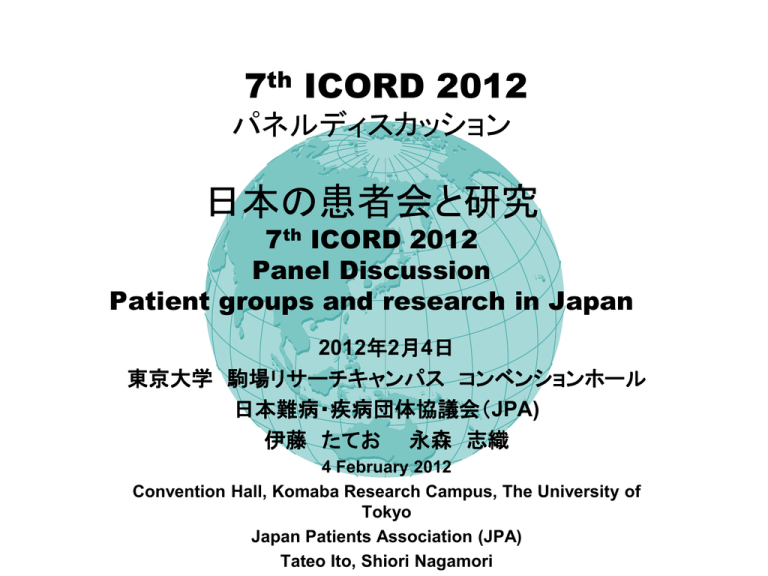
7th ICORD 2012 パネルディスカッション 日本の患者会と研究 7th ICORD 2012 Panel Discussion Patient groups and research in Japan 2012年2月4日 東京大学 駒場リサーチキャンパス コンベンションホール 日本難病・疾病団体協議会(JPA) 伊藤 たてお 永森 志織 4 February 2012 Convention Hall, Komaba Research Campus, The University of Tokyo Japan Patients Association (JPA) Tateo Ito, Shiori Nagamori 発表者変更 Speaker is changed 代表 伊藤 たてお 秘書 永森 志織 Representative Tateo Ito Secretary Shiori Nagamori 平成24年度厚生労働科学研究費補助金 難治性疾患克服研究事業 2012 MHLW subsidy for intractable diseases research • 日本難病・疾病団体協議会(JPA) が 代表者となって研究者とともに応募 • 患者団体としては初めて研究機関とし て登録 • • 公募課題「患者および患者支援団体 等による研究支援体制の構築にかか わる研究」 研究班は①研究者グループ ②患者 団体グループに分けることができる • 研究期間は2年間 • 研究費は2年間でおよそ6千万円とし て申請 • • • • • Became representative of JPA (Japan Patients Association) (1st patient group to be registered as research institution) and applied with other researchers Research topic: research related to building research support structure by patients and patient support organizations etc. Research group can be divided into 2 groups - 1) researchers 2) patient groups Research period is for 2 years Applied for 60 million yen for 2 years as research budget 主な研究課題 Main research topic • 希少疾患のレジストリ構築 (第1年度は3疾患程度を予定、 先行しているレジストリのリサーチも 行う、 製薬関係とも連携予定、 法的な検討も行う) • 国内の患者団体の活動と財政に関 する調査 (ヒアリングとフィールドリ サーチ) • 国外の患者団体の活動と財政に関 する調査(ヒアリングとフィールドリ サーチ) • 国内外の学会への参加 • • • • Build rare diseases registry (about 3 diseases planned for the first year, will also conduct research on existing registry, collaborate with pharmaceutical companies, and review legal aspects) Investigate activities and finances of domestic patient groups (hearing and field research) Investigate activities and finances of overseas patient groups (hearing and field research) Participate in overseas/domestic medical conferences 主な研究費の使い方(申請時点での概算) Main use of research cost (rough estimate at time of application) • レジストリ構築関係 1,900万円 • 国内外患者会調査、 学会参加、海外識者招聘など 2,200万円 • 会議、翻訳、コンサル関係 1,050万円 • 人件費・謝金ほか 650万円 • そのほか経費 • Building registry 19 million yen • Investigating overseas/domestic patient groups, participating in medical conferences, inviting overseas KEE 22 million yen • Meetings, translation, consultation 10.5 million yen • Labour cost, gratuity etc. 6.5 million yen • Other expenses レジストリ構築疾病選定の手順について 研究分担者の案 Disease selection process for building registry Proposal of researchers • 長期的にはすべての難病(希少・ 難治性疾患)の患者レジストリを 構築し,それぞれの疾患の研究 などへ役立てることを目指してい るが,最初の2年間(平成24〜25 年度)では登録する疾患を3疾患 前後に絞り,患者レジストリの構 築方法そのものの研究を行う。こ こでJPAが主体となって構築する 患者レジストリの有効性が示され た場合には,対象疾患を広げて いく。 • 最初の2年間の対象疾患は,次 のような基準で選ぶことを予定し ている。 • • In the long term, the aim is to build patient registries for all intractable diseases (rare & refractory) for use in research of each disease. However, the first 2 years (2012-2013) will focus on registering around 3 diseases and researching ways to build a patient registry. If the patient registry building led by JPA is shown to be effective, it will be applied to other diseases. Diseases to be registered during the first 2 years will be selected based on the following criteria; A. 患者もしくは患者会が研究のための実態調査に 対して理解・意欲がある。 B.協力してもらえる専門医・主治医がいる。 ・診断基準などを慎重に相談しなくてはならないの で,医師の協力が欠かせない。 C.患者もしくは専門医・主治医が実態調査の必要 性を感じている。 ・例)実態が把握されていない,もしくはこれまでの 実態調査に不備・不満がある。 これらの条件を満たしていることを前提に,次の疾 患群から選ぶ: 1.明確な診断基準がなく,研究が進んでいない疾 患(1〜2疾患)。 ・患者レジストリの主な目的の一つは,研究が進ん でいない疾患の研究を促進することにある。 2.診断基準はあるが,さらなる研究の進展が望ま れている疾患(1〜2疾患)。 ・研究奨励分野に入っていることが望ましい。 ・患者数が特に少ないと推定されていることが望ま しい(500人未満)。 3.慢性疾患(0〜1疾患)。 ・難病には根治しないものが多く,慢性疾患をどう ケアするかは大きな問題となっている。 A. Patient or patient group has the understanding and motivation for investigating the actual situation for research purposes B.Specialist/doctor who is willing to cooperate exists ・ Cooperation of doctors is essential as we need to consult them carefully regarding diagnosis criteria etc. C. Patient or specialist/doctor feels the need to investigate actual situation ・ ie) Actual situation unknown, or past investigations have been unsatisfactory Assuming that the above conditions are met, selection will be made among the following: 1. Diseases with no clear diagnosis criteria and no progress in research (1-2 diseases) ・ One of the aims of patient registries is to promote the research of diseases that are making no progress 2. Diseases that have diagnosis criteria but further advancements in research is hoped (1-2 diseases) ・ It is preferred that the disease is included in the areas for which research is encouraged ・ It is preferred that the number of patients is particularly small (less than 500) 3.Chronic diseases (0-1 disease) ・ Many intractable diseases are incurable and care for chronic diseases is a major issue 研究メンバーについて Research members (まだ全ては確定はしていないが) • 研究代表者 伊藤たてお ①研究グループ統括 西村由希子 分担研究者 森田瑞樹 児玉知子 安念潤司ほか ②患者団体グループ統括 伊藤たてお 研究協力者 水谷幸司 永森志織 森幸子 大黒宏司ほか さまざまな幅広い分野からの協力体 制を想定しています。 ・「希少性難治性疾患患者に関する医療 の向上及び患者支援のあり方に関す る研究班」(通称西澤班)とも連携 • 班友として、金澤一郎先生(難病対 策委員会委員長、国際医療福祉大 学院院長、前日本学術会議会長、ほ か)のご指導をいただく予定 (Not final) • Research representative: Tateo Ito ①Research group head: Yukiko Nishimura Sub-researchers: Mizuki Morita, Tomoko Kodama, Junji Annen and others ②Patient group head: Tateo Ito Research supporters: Koji Mizutani, Shiori Nagamori, Sachiko Mori, Hiroshi Oguro and others Support structure comprised of a wide range of areas ・Collaborate with study group on improving healthcare and supporting patients suffering from rare/refractory diseases (Nishizawa-han) • Plan to receive guidance from Dr Ichiro Kanazawa (Chief of the MHLW Committee for “The Management of Intractable Diseases”, director of International University of Health and Welfare Graduate School, former chairman of Science Council of Japan 製薬企業に求めるもの What is requested of pharmaceutical companies • • • • • • 当研究への協力(情報や人材の提供 など) 製薬企業から研究に対する要望 海外の研究情報(創薬、リスクマネジメ ント、新薬最新情報など) 海外患者団体の情報と連携への支援 アジアの患者団体との連携構築の支 援 レジストリが本格稼動することになった 場合の協同と参加 • • • • • • Support toward this research (provision of information and people) Requests from pharmaceutical companies toward this study Information on overseas research (drug discovery, risk management, latest information on new drugs) Information on overseas patient groups and support toward collaboration Support toward building partnerships with patient groups in Asia Cooperation and participation when registry becomes fully operational 終わりにいくつかの私の思うことについて My personal views • • • • • • 話し合うこと、「誤解」があればそれを 解く努力をすることは大切 だが 「誤解」は本当によくないことなの か? 誤解はなぜ生まれるかな、もっと大 切なことはないのかな、その逆はな いのかな 「正しい理解」とは何をさすのかな 問題提起も企業目線だけではなく 患者は知らない、しかし、被害は患者 に、そして利益も患者に、ニーズは患 者から、希望は患者へ! • • • • • • Discussing and making efforts to correct “misunderstandings” is important but are “misunderstandings” really that bad? Why do misunderstandings develop? Aren’t there things that are more important? What would be the opposite? What does “correct understanding” mean? Raising questions not only from the perspective of a company Patients do not know, but patients are the victims and patients are the beneficiaries, needs stem from patients, give hope to patients!
